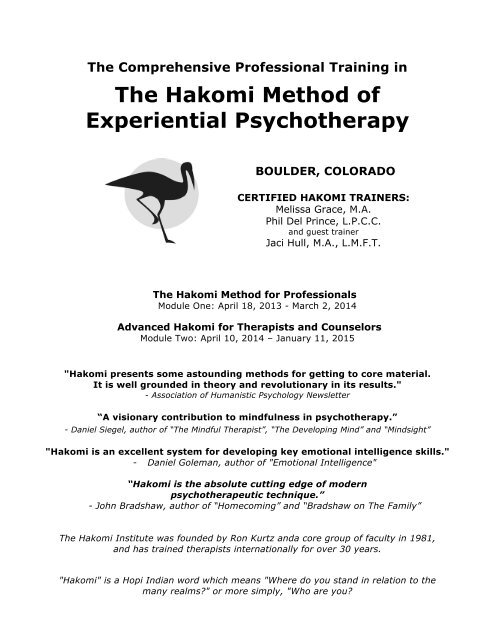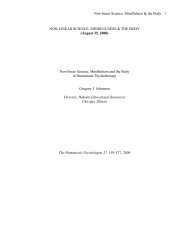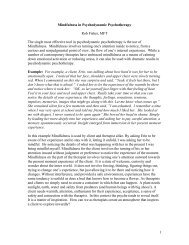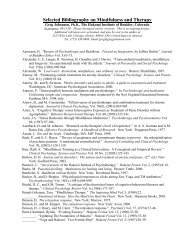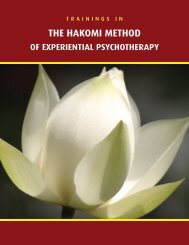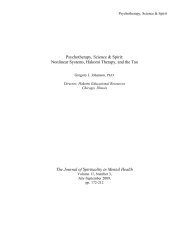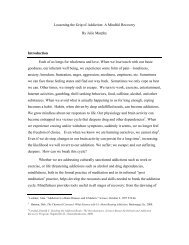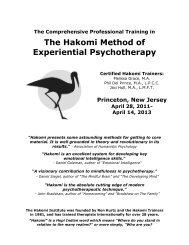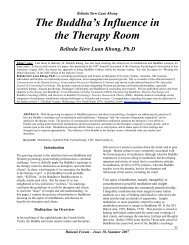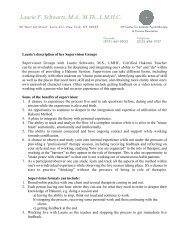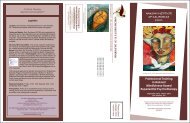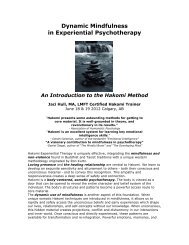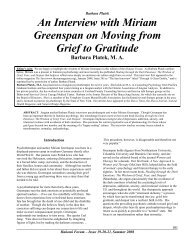Download - Hakomi Institute
Download - Hakomi Institute
Download - Hakomi Institute
Create successful ePaper yourself
Turn your PDF publications into a flip-book with our unique Google optimized e-Paper software.
The Comprehensive Professional Training in<br />
The <strong>Hakomi</strong> Method of<br />
Experiential Psychotherapy<br />
BOULDER, COLORADO<br />
CERTIFIED HAKOMI TRAINERS:<br />
Melissa Grace, M.A.<br />
Phil Del Prince, L.P.C.C.<br />
and guest trainer<br />
Jaci Hull, M.A., L.M.F.T.<br />
The <strong>Hakomi</strong> Method for Professionals<br />
Module One: April 18, 2013 - March 2, 2014<br />
Advanced <strong>Hakomi</strong> for Therapists and Counselors<br />
Module Two: April 10, 2014 – January 11, 2015<br />
"<strong>Hakomi</strong> presents some astounding methods for getting to core material.<br />
It is well grounded in theory and revolutionary in its results."<br />
- Association of Humanistic Psychology Newsletter<br />
“A visionary contribution to mindfulness in psychotherapy.”<br />
- Daniel Siegel, author of “The Mindful Therapist”, “The Developing Mind” and “Mindsight”<br />
"<strong>Hakomi</strong> is an excellent system for developing key emotional intelligence skills."<br />
- Daniel Goleman, author of "Emotional Intelligence"<br />
“<strong>Hakomi</strong> is the absolute cutting edge of modern<br />
psychotherapeutic technique.”<br />
- John Bradshaw, author of “Homecoming” and “Bradshaw on The Family”<br />
The <strong>Hakomi</strong> <strong>Institute</strong> was founded by Ron Kurtz anda core group of faculty in 1981,<br />
and has trained therapists internationally for over 30 years.<br />
"<strong>Hakomi</strong>" is a Hopi Indian word which means "Where do you stand in relation to the<br />
many realms?" or more simply, "Who are you?
The <strong>Hakomi</strong> Method is an elegant, comprehensive, and uniquely effective<br />
approach to psychotherapy and transformation. It integrates the mindfulness and<br />
non-violence found in Taoist and Buddhist traditions with an innovative Western<br />
methodology. The core of the training emphasizes the innovative techniques and<br />
principles developed by Ron Kurtz and the <strong>Hakomi</strong> faculty, and the self-development<br />
and evolution of the therapist. The <strong>Hakomi</strong> <strong>Institute</strong> has continued to evolve and<br />
advance the Method to integrate leading-edge developments in the neuroscience and<br />
psychological fields to create the most effective and applicable training for<br />
professionals.<br />
Loving presence and the healing relationship are central to <strong>Hakomi</strong>.<br />
Practitioners develop an exquisite sensitivity and attunement to others - both their<br />
conscious and unconscious material, and enhance their ability to convey this<br />
recognition. This creates a deep sense of safety and connection, and engages the<br />
“cooperation of the unconscious.”<br />
Current neuroscience is also revealing the basis for the effectiveness of<br />
mindfulness, loving presence, empathy, and other aspects of <strong>Hakomi</strong> Therapy.<br />
Neuropsychology is integrated in a user-friendly framework throughout the training.<br />
The training facilitates the emergence of the “essence” of the<br />
practitioner. Research shows that this therapeutic presence and the healing<br />
relationship it facilitates are among the most significant factors in terms of the<br />
effectiveness of therapy. The self-awareness and process of the <strong>Hakomi</strong> student<br />
therefore become an essential aspect in their evolution as a therapist.<br />
<strong>Hakomi</strong> is a body-centered, somatic psychotherapy. The body is viewed<br />
as a “map of the psyche” – a door that can be opened to reveal the entire character<br />
and belief system of the individual. The body's structures and habitual patterns serve<br />
as powerful “indicators” – subtle access routes to unconscious and evocative core<br />
material.<br />
The dynamic use of mindfulness is also foundational to <strong>Hakomi</strong>. When<br />
integrated with unique <strong>Hakomi</strong> techniques it allows us to rapidly access the deeply<br />
held, unconscious beliefs and early experiences which shape our lives, relationships,<br />
and self-perceptions, often without our knowledge. When unconscious, this hidden<br />
material creates projections, conflict and disharmony in our interactions and inner<br />
lives. Once conscious and directly experienced, these patterns are available for<br />
transformation and re-integration. Powerful emotions, memories, and trauma may<br />
surface at times during the process and these are handled gently and effectively.<br />
Professionals using talk therapy as a primary modality discover that the<br />
experiential nature of <strong>Hakomi</strong> enables them to accesses key unconscious material<br />
quite rapidly, yet safely. These experiences evoke a powerful “felt sense” for the<br />
client, allowing them to take deeper ownership of core material, its integration, and<br />
resulting changes.<br />
As a depth psychology, <strong>Hakomi</strong> is a direct, empowering, and experiential<br />
process; and the material is also integrated cognitively and neurologically for<br />
the client.<br />
The <strong>Hakomi</strong> Method is effective for both brief and long-term therapy, and is<br />
appropriate for work with individuals, couples, and groups.
Module One: The <strong>Hakomi</strong> Method for Professionals<br />
Includes a thorough grounding in the theory and techniques of the <strong>Hakomi</strong> Method:<br />
- The Dynamic Use of Mindfulness in Therapy - The Neuroscience of <strong>Hakomi</strong><br />
- The <strong>Hakomi</strong> Principles and Techniques - The Psychology of the Body<br />
- Working Experientially and Somatically - Creating Safety in Group Process<br />
- Loving Presence and the Healing Relationship - Embracing Resistance and Defenses<br />
- Working with Core Unconscious Material - Recognizing Traumatic Processes<br />
Module Two: Advanced <strong>Hakomi</strong> for Therapists and Counselors<br />
Presents an advanced level of the work, refines the techniques, and provides maps for<br />
effective application of the material in a variety of client situations:<br />
- The Traumatic Process Part II - <strong>Hakomi</strong> and Attachment Theory<br />
- Character Theory and Developmental Issues - Clinical Applications of <strong>Hakomi</strong><br />
- Working with Strong Emotions - Ethics as Right Use of Power<br />
- Enhancing Your Unique Therapeutic Style - Advanced Supervised Practice<br />
For a detailed description of the Comprehensive Training and curriculum, please<br />
request our brochure "<strong>Hakomi</strong> Therapy Trainings.”<br />
The <strong>Hakomi</strong> Training is primarily designed for individuals practicing and/or studying<br />
in the fields of psychotherapy, counseling and social work.<br />
Module One is also appropriate for individuals working in related fields, including<br />
coaching, education, consulting, group work, bodywork, and other healing practices.<br />
Module Two is primarily designed for therapists, counselors, and clinical social<br />
workers, as well as graduate students and individuals transitioning into these fields.<br />
DATES:<br />
MODULE ONE: 2013: April 18-21, June 6-9, September 5-8, October 3-6,<br />
November 14-17,December 12-15: 2014: January 23-26, March 6-9<br />
MODULE TWO: 2014: April 10-13, May 15-18, June 26-29, September 4-7,<br />
October 9-12, November 20-23; 2015: January 8-11<br />
TIMES:<br />
Thursday, Friday and Saturday 9:30-5:30, Sunday 9:30-1:30<br />
The tuition for Module One is $3750.<br />
The tuition for Module Two is $3350.<br />
The discount for paying by the first day of the training is<br />
$300 for Module One and $200 for Module Two.<br />
Payment plans and a limited number of work-study discounts are available.<br />
Low-cost lodging is available for out-of-town students.<br />
An approved two-day <strong>Hakomi</strong> introductory workshop serves as<br />
the prerequisite for Module One.<br />
Module One and permission of the instructors serve as prerequisites for Module Two.
FOR MODULE ONE:<br />
The Application Deadline is March 25, 2013.<br />
The Early Application Deadline ($250 discount) is February 18, 2013.<br />
FOR MODULE TWO:<br />
The Enrollment Deadline is March 10, 2014.<br />
The Early Enrollment Deadline ($200 discount) is February 3, 2014.<br />
For more information, or to request a training brochure or application,<br />
call 303-266-1866 or email <strong>Hakomi</strong>TR@aol.com<br />
Visit the <strong>Hakomi</strong> <strong>Institute</strong> website at www.<strong>Hakomi</strong>.org<br />
What participants have said about the training:<br />
“A gift – a wonderful experience that will shape the rest of my life.”<br />
- Kate Mazuy, M.A., L.P.C., Colorado<br />
"I learned so much, thoroughly enjoyed the people and process, and found the instructors<br />
awesome in the breadth and depth of their experience and knowledge"<br />
- Pat Waterman, L.C.S.W., Vermont<br />
“Excellent - rich and satisfying. It has expanded me as a person and as a therapist. The<br />
trainers were exceptional - all were superlative. The training enables you to deepen selfawareness,<br />
become more present, and learn to work with inner and outer challenges with<br />
ease, compassion and honestly - and then help others to do the same.”<br />
- Debra Babarsky, M.A., L.P.C., Virginia<br />
-<br />
“ A “10”. I cannot speak highly enough about the trainers and the consistency of<br />
excellence.” - Keating Coffey, M.A., L.P.C., Colorado<br />
“It has been the most powerful journey I have ever taken.”<br />
- Thomas Ruettgers, M.A., Psychotherapist, Germany<br />
“Learning the <strong>Hakomi</strong> Method has been one of the most personally and professionally<br />
enriching experiences of my career. I have gained tools to help my clients rapidly access<br />
and transform their pain and struggle, and found it profoundly effective across a wide<br />
range of individuals with a variety of long-term and challenging clinical and life problems.<br />
I cannot recommend this training highly enough.”<br />
– Jeffrey Rutstein, Psy.D., Clinical Psychologist, New Jersey<br />
CEU’s:<br />
- NASW: This program is approved by the National Association of Social Workers<br />
(NASW Provider # 886484280).<br />
- NAADAC: CEU’S are available for alcohol and drug abuse counselors.<br />
- NBCC: <strong>Hakomi</strong> <strong>Institute</strong> is recognized by the National Board for Certified Counselors<br />
to offer Continuing Education for National Certified Counselors.<br />
We adhere to NBCC Continuing Education Guidelines (Provider #5476).<br />
(NBCC-approved programs may be used for license requirements for LPC’s, LMHC’s,<br />
and LMFT’s in certain states, please inquire)<br />
- APA/Psychologists: We are currently applying for provider status.


